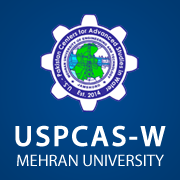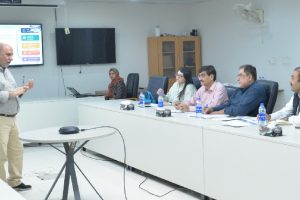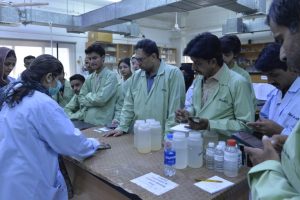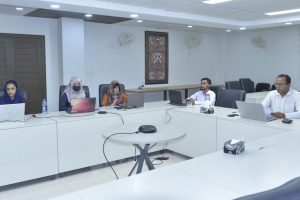Visit of Utah Mission July Session, 2016
Introduction
The US-Pakistan Center for Advanced Studies in Water has been established at Mehran University of Engineering and Technology (MUET) in Jamshoro, with financial support of USAID. The University of Utah (UU), USA, is providing technical assistance to MUET in preparing the next generation of water sustainability leaders by improving latter’s technical and institutional capacities in delivering high quality education and applied research. In addition to long-term capacity building, both partner universities have embarked on inculcating best practices of faculty members and students through participatory seminars. The continuation of the Effective Teaching Workshops at MUET has been organized as a way to improve teaching to support the educational mission of USPCASW. In the proposed Workshop, the focus will be to establish a faculty-led process for course review and improvement, and to apply the process to incorporate new or improved experiential learning activities into courses. The delivery of this workshop occurs over the summer providing sufficient time to develop teaching materials to use in the fall 2016 semester.
USPCASW Curriculum
The USPCASW curriculum includes four degree programs (Integrated Water Resources Management (IWRM); Hydraulics, Irrigation, and Drainage (HID); Environmental Engineering(EnvEng); and Water, Sanitation, and Health (WASH) Science). Three programs (IWRM, HID, EnvEng) were initiated with students enrolled in the fall 2015 semester. Fifteen new or significantly revised courses were delivered in the fall 2015 semester for 50 graduate students. WASH is being initiated in the fall 2016 semester. This workshop will support the Curriculum Reform effort in all four degree programs.
Effective Teaching Training
A USPCASW Effective Teaching Workshop was the anchor workshop for the June 2015 UU mission to MUET and an Effective Teaching Boot Camp was delivered as part of the December 2015 mission. All available USPCASW faculty members from MUET participated in those two workshops to build a strong foundation in teaching and learning theory and practice and develop teaching materials for courses. Specific topics included describing a model instructional strategy, backward design of instruction, principles of effective teaching, learning objectives, lesson planning, learning styles, engaging students, active and collaborative learning, and assessment. The principles and techniques were then incorporated into USPCASW program courses offered in the fall 2015 and spring 2016 semesters. The proposed Workshop seeks to inculcate a continuous improvement process and develop experiential learning activities. Creating strength in experiential learning aligns with the goal to make the curriculum more practical, applied, and replete with hands-on real-world experiences to enhance the education programs.




